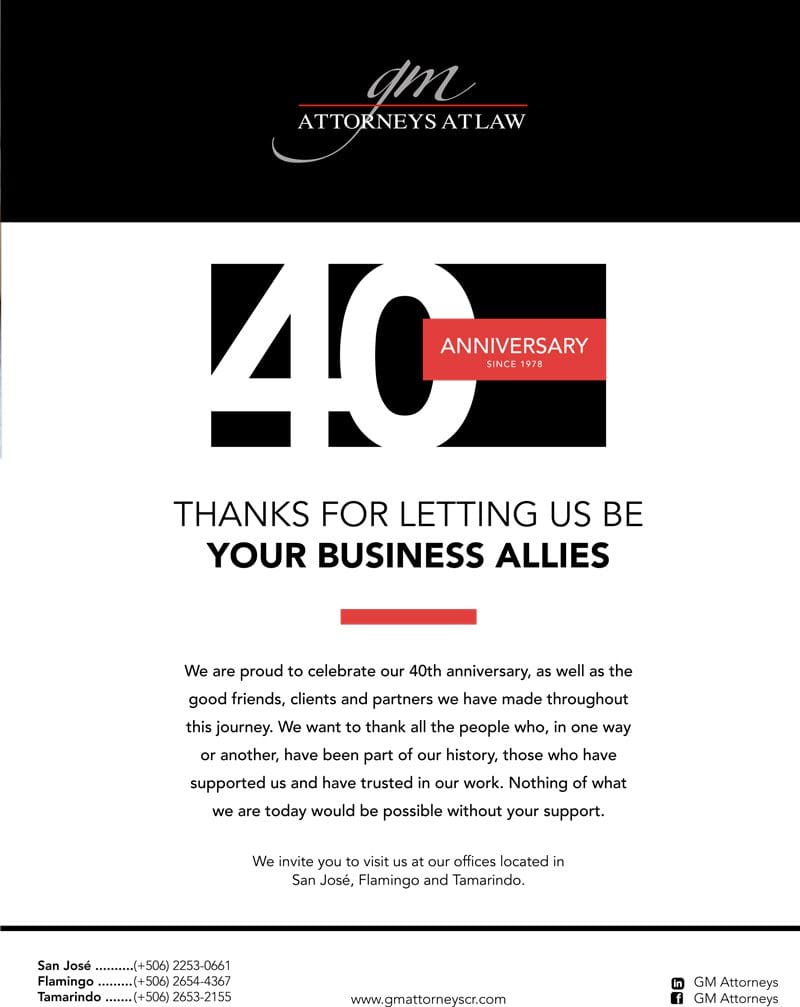
Legal Ease- Costa Rica Annual Taxes Due
Costa Rica Annual Taxes Due: As a Costa Rican property and/or corporation owner, you should be aware of taxes that need to be paid annually. Failure to comply may be subject to fines and judicial collection procedures.
Luxury Tax
— next due January 15, 2019
Costa Rica’s Solidarity Tax for the Strengthening of Housing Programmes (Impuesto Solidario para el Fortalecimiento de Programas de Vivienda) is commonly known as Luxury Tax. It applies to houses, condominiums and apartments with a construction/building value exceeding an exempt amount determined by the Tax Office, adjusted each year. The current amount for 2018 is 129,000,000 colones, about US$230,000. The amount of tax paid is determined on a scale from 0.25 percent to 0.55 percent per year, depending on your declared property value.
Non-exempt homeowners are required to pay the applicable tax amount every year, and must file this declaration form every three years: D-179 “Formulario Único de Inscripción, Declaración y Pago Impuesto Solidario para el Fortalecimiento de Programas de Vivienda, Ley 8683.” The form and relevant details are available online.
The next Luxury Home Tax filing deadline is Jan.15, 2019. Parameters for the following tax year will be published by the Tax Office in late December.
For more details, see Howler’s LegalEase article in the November 2018 issue.
Annual Corporate Tax
— next due January 30, 2019
Effective September 1, 2017, all corporations, subsidiaries and limited liability companies registered before the National Registry, currently or in the future, as well as all entities incorporated in the future, are subject to pay an annual tax under Law # 9428: “Tax over legal entities.”
A fixed amount of $120 applies to inactive corporations. A progressive rate for active corporations depends on income and ranges from $120 to $380.
If this tax is not duly paid, the National Registry will not issue, certify or register any documents for the corporations involved. Furthermore, the companies will not be able to contract with the government or any public institution.
Property Taxes and Garbage Collection Fee
— next due March 31, 2019
Property owners must pay an annual property tax (impuestos bienes inmuebles) and garbage collection fee (recolección basura) to the municipal government (municipalidad) where their property is located.
The property tax is 0.25% of the registered value of the property, which is either the purchase price paid or the value assigned by the Tax Office.
The garbage collection fee is a fixed amount, adjusted yearly, that must be collected along with the property taxes. The municipality determines the fee based on location and on whether the property is used for residential or commercial purposes.
Note: The Municipalidad de Santa Cruz does not always charge both amounts payable in the same statement, which may cause property owners confusion and inconvenience. The municipality has attributed this to “lack of updated records and/or to administrative errors within the system.” Therefore, the property owners involved are advised to review their statement carefully to avoid unpleasant surprises.
This property tax and garbage collection fee can be paid a year in advance or quarterly. However, if paid quarterly, you must pay before the end of each quarter to avoid interest charges. The first quarter of the year ends on March 31.
Owners must fill out a form to update the value of their property every five years. Failure to do so can lead to a municipality assessment and fines.
The municipality is currently requiring property owners to update the value of their properties prior to the last quarter of this year 2018 and first quarter of 2019.
Need a reputable lawyer in Costa Rica
Contact: GM Attorneys at Law
Tell them you learned about them from Howler Magazine
HOA Meetings
Tax Time, Corporations and Property Owners
Corporate Tax Update
Power of Attorney in Costa Rica
Annual Tax Over Costa Rica Corporations
Due Diligence, Purchasing a Vehicle in Costa Rica
Costa Rica Income and Sales Tax
Estate Planning
Purchasing a Condominium in Costa Rica
Buying a Business in Costa Rica
Applying for Cost Rica Residency
Corporate Alert
Set Up a Corporation in Costa Rica

